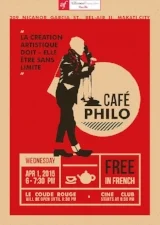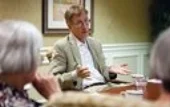Philosophical Dialogues are open-ended, facilitated group discussions about core beliefs and commitments, usually involving eight or more people, and lasting about one to one and a half hours. Dialogues allow participants to converse, perhaps for the very first time, about perceptions of personal and corporate reality, identity, meaning, purpose and value. They empower people to dig deeper together into the ideas and assumptions that shape belief and action, while constructively leveraging disagreement into a deeper appreciation of diversity as an asset and not a deficit. They offer a powerful and appealing way to build relationships within a group, community or organization, while increasing everyone’s intellectual capital.
Philosophical Cafés
Whenever people gather to pursue a common purpose, in this case philosophical discussion, there is a synergy which I enjoy and from I which I learn and in turn by which I am energized. In some respects all of us know more than any one of us."
Lloyd Kleindinst, Ph.D., Educator
Philosophical Café is a public philosophical dialogue. It's a free form, open-ended philosophical conversation, open to anyone who enjoys challenging, public discussions of issues that matter. Cafés are the places natural environments for such public conversations. Coffee is a stimulant, and we typically go to cafés to stimulate and sharpen our minds through reading, conversation and reflection.
The Café movement began quite by accident in 1992. A newspaper article on a group of philosophy professors, led by Marc Sautet, who were engaged in a new non-academic application of philosophy called Philosophical Counseling happened to divulge the time and location of their weekly meetings together in a Parisian café. The next week ten people showed up at the café wanting to know if this was where the philosophers met. Rather than turning them away, the professors invited them to join them for a conversation about the meaning of death. The next week, thirty people showed up, and the week after that there were close to a hundred who came to what was now known as the “Café-Philo.” Soon the philosophers had fanned out into neighboring cafés to start up additional Cafés-Philos, and viola!, within a few months a movement was born. There are now hundreds of Café-Philos (also known as Socrates Café, Philosophical Café and Philosophical Salon) in dozens of countries, including France, Great Britain, Mexico and the United States.
A typical Café begins with the facilitator soliciting suggestions for topics of discussion. These can range anywhere from questions like “What is true security?” and “What is a good life?” to issues like “Should we use violence to prevent violence?” After collecting the proposals, one issue is chosen and the discussion begins.
The direction of the conversation is in no way guided by professional academic agendas: it is pushed to and fro by questions and interchanges within the group. There is a moderator (usually a trained philosopher), but his or her main function is to make sure that everybody gets a chance to speak, to occasionally “prime the pump,” to keep the discussion on track, and to help people clarify what they are trying to say.
We too often let our experts do our thinking for us, and we too rarely gather with one another to converse about the most fundamental issues in our lives. The idea behind the Café is to foster a space where people can together reclaim their freedom to think and question. As such, Philosophical Café is profoundly political, although it assumes no overt political ideology. At its best, Philosophical Café helps us create, in one participant’s words, “moments of philosophy,” that is, moments where new, possibly value-transforming thoughts e
Philosophical Café in Retirement Communities
I’ve developed a unique version of the Philosophical Café that allows older adults in retirement communitiesto engage in lively discussions about issues that they care about. Topics range across a variety of philosophical questions and ethical dilemmas drawn from the lives of the participants themselves. Past topics have included “What is forgiveness?” “What do we owe the stranger?” and “What is companionship?”
Retirement Communities in St Louis I regularly lead Philosophical Cafés include the Gatesworth, The Brentomoor, The Sarah Community, McNight Place Assisted Living, The Fountains of Ellisville, Chesterfield Villas, Meramec Bluffs and Bethesda Orchard
Philanthropic Conversations
Philanthropic conversations are open, facilitated conversations that allow fundraisers to build and sustain relationships, organically, with donors, potential donors and friends of the institution.
I designed and facilitated an ongoing series of these for The School of Arts and Sciences at Webster University called “Webster University Ethics Roundtable with Dave Hilditch, Ph.D.” from 2004-2006. After less than two years, the program yielded significant donor gifts. More importantly it enabled the Dean and the Development office to make new connections in the community and to deepen old friendships.
Topics at the Webster University Ethics Roundtable included the Iraq War, Assisted Suicide, Social Security Reform, The Ethics of Food, The Nature of the Good Life, Happiness, and Tort Reform.
Corporate Dialogues
Philosophical Dialogue can be used to help individuals within and across groups and organizations have meaningful and productive conversations about issues concerning identity, goals, values and purpose. I base my facilitation practice in organizations and corporate settings on three core values: sincerity and accuracy in providing information; respect for free and informed choice; and internal commitment to any choices or decisions that are made.
Organizations which have benefited from my facilitation include:
- Boeing
- SBC
- Maritz
- AmerenUE
- Nestles/Ralston
- GKN
- Lincoln Engineering


